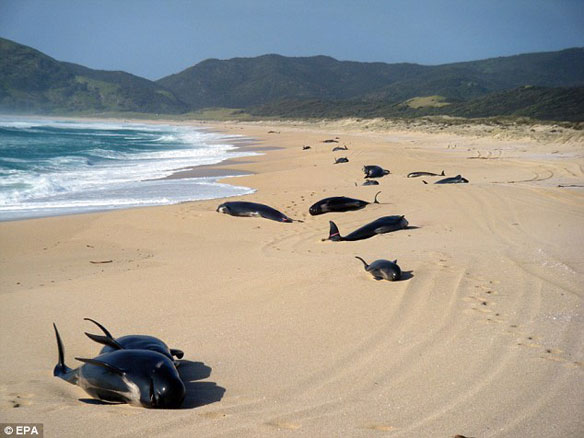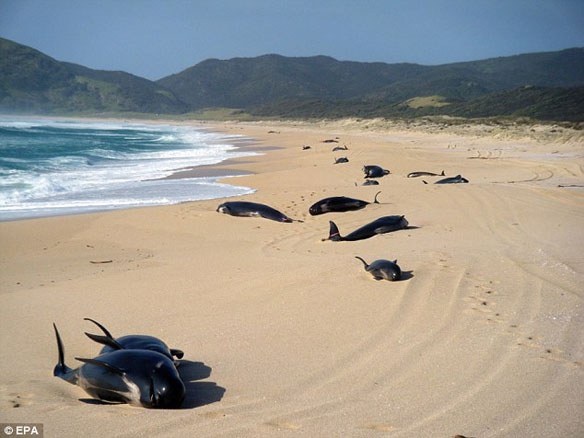
Whales stranded in New Zealand refloat themselves
By The Associated Press
Sixty-six survivors of a pod of 80 pilot whales that beached in New Zealand freed themselves and swam back to sea during a high tide, rescuers said on Saturday.
Fourteen of the pod were unable to be saved and had died, Conservation Department spokeswoman Trish Grant said.
The whales came ashore at Golden Bay north of the city of Nelson on the tip of South Island on Friday afternoon.
About 100 rescuers had been unable to refloat the whales before darkness fell Friday night. The rescuers set up camp nearby with plans to try again at first light.
Grant said the rescuers returned to the site of the stranding Saturday morning to find the whales had gone. It appeared a high tide around midnight had allowed the stranded whales to free themselves.
“We don’t know whether they have managed to swim safely out to sea or whether they may have stranded somewhere else along the coast,” she said. “Some, even though they are refloated, do wash up dead later on because they’ve been through such an ordeal so they are considerably weakened by it.”
Pilot whales are about 13 to 20 feet (four meters to six meters) long and are the most common species of whale in New Zealand waters.
Whale strandings are commonplace in New Zealand. Last month 24 pilot whales died after stranding on the North Island. In December 2009, more than 120 whales died in two separate beachings near Golden Bay and on the east coast of North Island.
Rescuers Struggle to Save Beached Whales, New Zealand
By The Associated Press
Rescuers struggled to save scores of pilot whales after 80 beached themselves in New Zealand on Friday. By evening, nine had died and others were not expected to last the night, conservation officials said.
An initial group of 30 whales had beached at Golden Bay, near the northern tip of New Zealand’s South Island, and more among their pod were coming in to shore when rescuers arrived. The rescuers managed to turn away four whales, but another 50 hit the beach, Conservation Department spokeswoman Trish Grant said.
More than 100 rescuers, including New Zealand and overseas tourists, tried to keep the whales cool by dousing them with sea water during the late afternoon and evening on Friday.
Nine died and grave fears were held for many of the others because unfavorable tides meant there was no hope of returning them to the sea before Saturday, Grant said.
“It’s likely that more will die overnight because stranding is quite an ordeal for them, it’s stressful,” Grant said. “But also, some just get drowned, they just can’t get into an upright position as the water comes and they can’t breathe.”
Staying by the whales in the dark was too dangerous and rescuers would not likely be called in until the morning, she said.
“We’d be optimistic that there’s surviving whales tomorrow that we can refloat,” she said.
Whale strandings are commonplace in New Zealand. Last month 24 pilot whales died after stranding in the North Island. In December 2009, more than 120 whales died in two separate beachings near Golden Bay and on the east coast of North Island.
14 Beached Whales Saved, NZ, in Coastal Care









